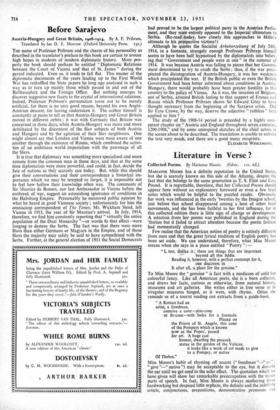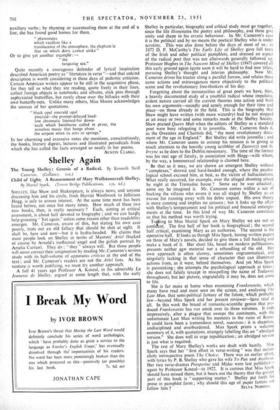Literature in Verse - ?
Collected Poems. By Marianne Moore. (Faber. 12s. 6d.)
MARIANNE MOORE has a definite reputation in the United States, but she is scarcely known on this side of the. Atlantic, despite the fact that she belongs to the same generation as T. S. Eliot and Ezra Pound. It is regrettable, therefore, that her Collected Poems should appear -here without an explanatory foreword or even a few brief notes which would be helpful to the puzzled reader. Obviously her work was influenced in. the early 'twenties by the Imagist school. just before that school disappeared among a host of other brief movements, and she has been faithful to her first influence, for in this collected edition there is little sign of change or development. A selection from her poems was published in England during the 'thirties but it failed to attract attention because the poetic fashion had momentarily changed. Few realise that the American notion of poetry is entirely different from ours and that the great lyrical tradition of English poetry has been set aside. We can understand, therefore, what. Miss Moore means when she says in a piece entitled " Poetry " — " I, too, dislike it ; there are things that are important beyond all this fiddle.
Reading it, however, with a perfect contempt for it, one discovers in It after all, a• place for the genuine."
To Miss Moore the " genuine " is fact with a modicum of cold but colourful fancy. Like all American poets, she is a born collector, and draws her facts, curious or otherwise, from natural history, museums and art galleries. She writes either in -free verse or in irregular measures hinged, as it were, with rhyme. Often she reminds us of a tourist reading out extracts from a guide-book.
" A Roman had an artist, a freedman, contrive a cone—pine-cone
or fir-Cone—with holes for a fountain-.
Placed on the Prison of St. Angelo, this cone of the Pompeys which is known now as the Popes', passed for art. A huge cast bronze, dwarfing the peacock statue in the garden of the Vatican, it looks like a work of art made to give to a Pompey, or native • Of Thebes."
Miss Moore's habit of rhyming off accent (" freedman "—" an "; " give"—" native") may be acceptable to the eye, but it disturbs the ear until we get used to the echo effect. The quotation which we have given will show her remarkable preoccupation with the minor parts of speech. In fact, Miss Moore is always mothering those - hardworking but despised little orphans, the definite and the indefinite article, conjunctions. prepositions, demonstrative pronouns and auxiliary verbs ; by rhyming or accentuating them at the end of a line, she has found good homes for them.
" phenomena which vacillate like a translucence of the atmosphere, the elephant is that on which darts cannot strike "
Or to give yet another example:— " the
turquois2 sea."
Quite recently a courageous defender of lyrical inspiration described American poetry as " literature in verse "—and that unkind description is worth considering in these days of pedantic criticism. Certain American writers appear to be still in the acquisitive phase, for they tell us what they are reading, quote freely in their lines, collect foreign objects in notebooks and albums, stick pins through asphyxiated butterflies, but rarely chase over the hillocks with their own- butterfly-nets. Unlike many others, Miss Moore acknowledges the sources of her quotations.
" black opal emerald opal emerald=the prompt-delayed loud- low chromatic listened-for down- scale which Swinburne called in prose, the noiseless music that hangs about the serpent when its stirs or springs."
In her charming and extensive notes she mentions, conscientiously, the books, literary digests, lectures and illustrated periodicals from which she has culled the facts arranged so neatly in her poems.
AUSTIN CLARKE.



































 Previous page
Previous page